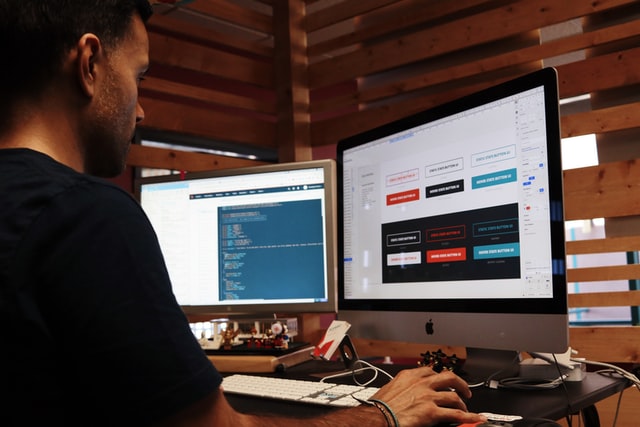Choosing a career path is never a simple decision, especially if you’re one of those people who are genuinely interested in everything and have a wide range of skills. You’re in a privileged position, that’s for sure, as you can have your pick, but when you’ve got countless opportunities to start a fruitful career, the decision-making process can be a bit challenging. It can take quite some time until you finally find your true calling, so you have to think long and heard before reaching a conclusion.
A lot of people these days are tempted to dive into the tech world and choose web design as their career path. The reasons are more than obvious. We live in a digital world where all companies and organizations must have an online presence. As such, there’s a high demand for skilled web designers that can create high-quality sites, and this trend is expected to grow in the future.
If web design appeals to you and you’re seriously considering starting a career in this field, it’s time to begin your research. So, grab a pen and paper and let’s explore this career option together.
What does a web designer do?
You might think this is a silly question, because a web designer obviously designs websites. Well, that’s perfectly true, but it doesn’t tell us all that much about the daily tasks and duties of a web designer. If you’re going to choose this as your career, you better become acquainted with everything that web design involves.
Web designers are responsible for creating visually appealing and functional websites that meet the client’s requirements. Since not all websites are the same, each project comes with its own set of requirements and challenges, so adaptability is a big part of the equation. Their work implies using web design languages to build, update or maintain a website to keep it running smoothly and ensure users have a positive experience with it.
Usually, to land a job as a web designer you’ll need a Bachelor’s Degree in Computer Science or a diploma in a related field. However, there are many talented web designers who didn’t take the traditional route and decided to be their own teachers. The most important aspect is to have a good portfolio you can present to potential employers. So, you can become a professional web designer with or without a diploma.
Moving on to the main duties of a web designer, you’ll have to:
- Employ different tech tools and languages to plan, build, and maintain websites
- Design all the elements and features of the website
- Use HTML to create the website layout
- Meet with clients to discuss the requirements of the project
- Come up with concepts and drafts for the website
- Keep clients up to date with the project’s progress and receive feedback from them
- Make changes and modifications as required by the clients
- Be up to date with the latest developments in the field
- Work with people from other disciplines
Some designers provide website design services for individual businesses, taking on the job of creating and maintaining sites for them, while others work with companies operating in the IT or marketing field. There’s also the option of becoming your own boss by working as a freelance web designer for individual clients, and running your activity as you see fit.
With regard to the financial aspect, web design can be a lucrative profession. However, the salary of a web designer varies depending on experience, previous work, employers and ultimately on the skills you possess. In the U.S. a web designer can earn anywhere between $7 to $54 per hour.
Why web design is a good career choice
Now that we’ve covered the basics, it’s time to take a closer look at the advantages of becoming a web designer. Here are some of the most important reasons a career in web design can be a good choice for you.
Job opportunities
Since every organization, institution, and company needs a website nowadays, there are plenty of web design positions available for those who want to get started in this field. Web design is a growing industry, so there’s always going to be a demand for talented web designers who can take on the challenge of creating unique professional websites. For those who prefer to work from home, they can opt for remote jobs in DC if they are looking for a competitive salary with the added benefit of flexibility. What’s more, there’s also plenty of room for advancement in this field, making the prospect of working as a web designer even more appealing.
Use your creativity
Working in tech might sound like such a dry and dull job, but that’s not the case with web design. Becoming a web designer gives you a chance to bring your creative side to light and use it to the fullest. You get to choose graphics, color schemes, create layouts and play with different design elements, so for the most part creativity will run the show.
Financial security
As far as money is concerned, a job as a web designer can ensure a good living. Even as a beginner, you’ll be able to earn a decent salary. As mentioned previously, the salary of a web designer depends on various factors, but considering the common salary for web designers in the U.S. is approximately $22 per hour, you’ll be able to live a comfortable life.
Flexibility
Web designers also enjoy a lot of flexibility in their profession. Since most of the work of a web designer can be done on a computer, you can take your job with you wherever you go and work from any location you please, as long as you have the necessary equipment. Freelance web designers can create their own schedules, choose the clients they want to work with and enjoy as much freedom as they like.
Exciting work life
A web designer never gets bored. Yes, some tasks are repetitive, but there’s always an element of excitement in web design. You can work across various industries on different projects, collaborate with clients all over the world, take on thrilling challenges, travel and be up to date with the latest tech advancements. There’s never a dull moment for web designers.







